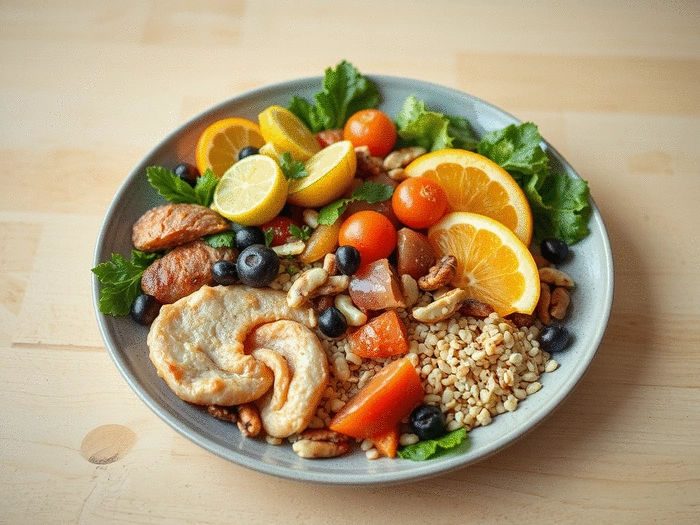Balanced Diet Tips for Seniors

Posted on: 2025-10-05
By: Elena Hartwell
As we navigate the vibrant journey of aging, the importance of nutrition becomes more pronounced. Did you know that tailoring a balanced diet can significantly enhance your vitality and overall health after 50? Discover how simple dietary changes can lead to profound benefits in your quality of life.
What You Will Learn
- The need for a nutrient-dense diet increases post-50 to combat slowed metabolism and changing nutritional needs.
- Increased protein intake is essential for muscle maintenance as we age, helping prevent muscle loss.
- Adequate hydration is crucial as our sense of thirst diminishes; aim to drink more fluids consciously.
- A balanced diet aids in disease prevention, particularly lowering the risks of diabetes and heart disease.
- Including whole grains in your meals supports digestion and provides sustained energy throughout the day.
- Fruits and vegetables are rich in vitamins and minerals, crucial for preventing age-related conditions.
- Calcium and vitamin D are vital for maintaining bone health; consider both dairy and non-dairy sources.
- Healthy fats, especially omega-3 fatty acids, play a significant role in supporting brain and heart health.
- Making gradual dietary changes can lead to lasting improvements in your health without overwhelming yourself.
- Engaging with a community can provide support and inspiration as you navigate your dietary journey.
Key Nutritional Components for Seniors Over 50
Understanding the essential dietary components can greatly enhance health and vitality for seniors.
Lean Proteins
Essential for muscle maintenance.
- Chicken or turkey breast
- Fish (salmon, trout)
- Legumes
- Low-fat dairy
Whole Grains
Provide sustained energy and fiber.
- Oats
- Quinoa
- Brown rice
- Whole grain pasta
Fruits & Vegetables
Rich in essential vitamins and minerals.
- Leafy greens
- Berries
- Citrus fruits
- Cruciferous vegetables
Understanding the Importance of a Balanced Diet for Seniors Over 50
As we embrace the beautiful journey of aging, understanding the significance of a balanced diet becomes essential, especially for those of us over 50. Our bodies go through various changes, including shifts in metabolism and nutritional needs. It’s like upgrading your car with premium fuel; we must ensure we are fueling our bodies with nutrient-dense foods to maintain vitality and health.
Once we cross the 50-year mark, our metabolism tends to slow down, making it crucial to adapt our diets accordingly. This means incorporating foods that are not only low in calories but also rich in vitamins and minerals. Think of it as a chance to explore a new world of flavors while ensuring we get the proper nourishment our bodies crave!
Exploring Nutritional Needs as We Age
As we age, our body’s demands for specific nutrients change. For instance, we start needing more calcium and vitamin D for bone health, while the need for fiber to support digestive health becomes increasingly important. Here are some key nutritional shifts to consider:
- Increase in Protein: Essential for muscle maintenance, especially as we lose muscle mass with age.
- More Fiber: Aids digestion and prevents constipation, which can be a common issue.
- Hydration: Our sense of thirst diminishes, so we need to consciously drink more fluids.
Embracing these changes can help us feel more energetic and vibrant. At Vital Aging Hub, we believe that understanding our nutritional needs is a stepping stone to a healthier life!
Health Benefits of a Balanced Diet
The benefits of maintaining a balanced diet are immense and can lead to a longer, healthier life. Proper nutrition not only keeps our bodies functioning optimally but also plays a critical role in preventing chronic diseases. Here are some health benefits associated with a well-rounded diet:
- Disease Prevention: A balanced diet can help reduce the risk of conditions like diabetes and heart disease.
- Bone Health: Adequate calcium and vitamin D intake supports bone density and strength.
- Muscle Maintenance: Sufficient protein consumption is crucial to maintain muscle mass as we age.
By making conscious dietary choices, we not only enhance our physical well-being but also boost our mental and emotional health. Nourishing our bodies with the right foods allows us to enjoy life more fully and with greater vitality!
Essential Components of a Balanced Diet for Older Adults
Incorporating Lean Proteins into Daily Meals
One of the important components of a balanced diet is lean proteins. They play a crucial role in maintaining muscle mass and supporting overall health. Here are some fantastic sources of lean proteins to incorporate into your meals:
- Chicken or turkey breast
- Fish, especially fatty fish like salmon or trout
- Legumes such as lentils and chickpeas
- Low-fat dairy products, like yogurt and cottage cheese
These options are not only nutritious but also versatile and can be prepared in numerous delicious ways. Remember, at Vital Aging Hub, we’re all about making healthy eating enjoyable!
The Role of Whole Grains in Senior Nutrition
Whole grains are another essential part of a balanced diet, especially for seniors. They are packed with fiber, which is vital for digestive health and maintaining energy levels throughout the day. Consider adding these whole grains to your meals:
- Oats
- Quinoa
- Brown rice
- Whole grain bread and pasta
These grains not only provide sustained energy but also help regulate blood sugar levels, which is a significant factor for maintaining overall health as we age.
Fruits and Vegetables: Nature’s Nutrient Powerhouses
Don’t forget about the vibrant fruits and vegetables that should fill our plates! They are packed with essential vitamins and minerals that help prevent age-related conditions. Aim for a colorful variety, such as:
- Leafy greens like spinach and kale
- Berries, which are high in antioxidants
- Citrus fruits for a vitamin C boost
- Cruciferous veggies like broccoli and cauliflower
These natural powerhouses not only add flavor and color to our meals but also contribute significantly to our health and wellness. Let's celebrate the beauty of fresh produce!
Importance of Calcium and Dairy in Diet
Calcium is crucial for maintaining strong bones, especially as we age. Incorporating dairy products into our diet can help us meet our calcium needs. Here are some great sources:
- Low-fat milk
- Yogurt
- Cheese
If you're lactose intolerant, don’t worry! There are plenty of alternatives like almond milk, soy milk, or lactose-free dairy products to ensure you’re still getting that essential calcium. It's all about finding what works best for you!
Healthy Fats: The Role of Omega-3 Fatty Acids
Healthy fats, particularly omega-3 fatty acids, are essential for supporting brain and heart health. You can find these beneficial fats in:
- Fatty fish like salmon
- Chia seeds
- Walnuts
- Flaxseeds
Incorporating these into your diet can significantly enhance your overall well-being. Remember, healthy fats are not just about limiting bad fats; it’s also about embracing the good ones!
Staying Hydrated: A Key Component of Senior Health
Hydration is often overlooked but is incredibly important as we age. Sometimes, we may not feel thirsty, but our bodies still need water. Here are some tips to encourage fluid intake:
- Keep a water bottle handy to remind yourself to sip throughout the day.
- Incorporate hydrating foods such as cucumbers, watermelon, and oranges.
- Set reminders on your phone to drink water regularly.
Staying hydrated not only supports physical health but can also enhance cognitive function and mood. Cheers to staying hydrated!
Quick Summary
Here's a brief recap of the key points discussed so far:
- Understanding the importance of a balanced diet for seniors over 50, focusing on nutrient-dense foods.
- Recognizing specific nutritional needs that change with age, such as increased protein, fiber, and hydration.
- Identifying essential components of a balanced diet, including lean proteins, whole grains, fruits, vegetables, calcium, and healthy fats.
Frequently Asked Questions
FAQs
- Why is nutrition important for seniors over 50?
Nutrition is crucial for seniors as it helps enhance vitality, supports overall health, and can prevent age-related diseases. - What are the key dietary changes needed after age 50?
Increased protein intake, higher fiber consumption, and ensuring adequate hydration are vital dietary changes needed after 50. - How can seniors maintain muscle mass as they age?
Incorporating lean proteins into meals and engaging in regular physical activity can help maintain muscle mass as we age. - What role do whole grains play in senior nutrition?
Whole grains provide essential fiber, aiding digestion and sustaining energy levels, which are important for overall health. - How important is hydration for seniors?
Staying hydrated is crucial as the sense of thirst diminishes with age, and proper hydration supports cognitive function and overall health.
Summarizing the Path to a Balanced Diet for Seniors
As we journey through our later years, maintaining a balanced diet becomes more crucial. For those of us over 50, focusing on nutrient-dense foods can help sustain our health and vitality. The key components we've explored—lean proteins, whole grains, fruits, vegetables, calcium, and healthy fats—work together to support our bodies and minds.
What's important is that this diet isn't one-size-fits-all. Each individual's needs may vary based on health conditions, activity level, and personal preferences. At Vital Aging Hub, we emphasize the importance of customizing your diet. By understanding your unique requirements, you can create a plan that truly supports your journey of aging with grace and vitality!
- Lean proteins for muscle maintenance
- Whole grains for energy and digestion
- Fruits and vegetables for essential vitamins
- Calcium and dairy for bone health
- Healthy fats for brain function
Encouraging a Gradual Approach to Dietary Changes
Making changes to your diet can feel like a big step, but it doesn't have to happen all at once! I encourage you to think about incremental changes that fit seamlessly into your daily routine. Perhaps start by adding an extra serving of vegetables at lunch or swapping out white bread for whole grain. These little adjustments can lead to big improvements over time!
It’s also a good idea to consult with healthcare professionals, like your doctor or a nutritionist. They can provide personalized advice tailored to your specific health needs. Remember, it's about making progress, not perfection. So, what small change will you make today?
Engaging with the Community: Sharing Experiences and Tips
Let's not forget the power of community! Sharing our experiences and tips can inspire and motivate others. I invite you to share your own thoughts on balanced eating in the comments below. What strategies have worked for you? Have you discovered any delicious recipes that cater to your health needs?
At Vital Aging Hub, we believe that fostering a supportive environment is key to thriving in our golden years. By exchanging ideas and encouragement, we can all navigate the journey of aging together. So, jump into the conversation! Your insights might just be the spark someone else needs to embark on their own health journey.
Recap of Key Points
Here is a quick recap of the important points discussed in the article:
- Embrace Nutrient-Dense Foods: Focus on foods rich in vitamins and minerals to support health as you age.
- Increase Protein and Fiber: Incorporate more lean proteins and fiber-rich foods to maintain muscle mass and support digestive health.
- Stay Hydrated: Make hydration a priority by drinking more fluids and including hydrating foods in your diet.
- Include Whole Grains: Opt for whole grains to provide sustained energy and help regulate blood sugar levels.
- Prioritize Calcium and Healthy Fats: Ensure adequate calcium intake for bone health and incorporate healthy fats like omega-3s for brain function.
- Customize Your Diet: Tailor your dietary choices based on your unique health needs and preferences for optimal wellness.
 What if the secret to feeling happier in your golden years lies in giving back? Research shows that
What if the secret to feeling happier in your golden years lies in giving back? Research shows that
 Have you ever considered how financial wellness can shape your retirement experience? The pathway to
Have you ever considered how financial wellness can shape your retirement experience? The pathway to
 What if a simple habit could enhance your cognitive function and overall vitality as you age? Hydrat
What if a simple habit could enhance your cognitive function and overall vitality as you age? Hydrat
